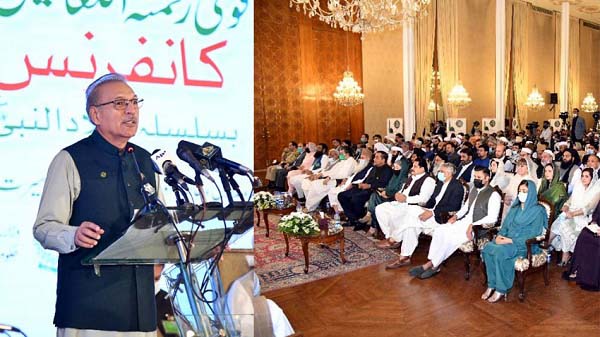Due role of nation’s four pillars including mosques to usher in revolution: President

Islamabad: President Dr Arif Alvi Tuesday while calling them the four pillars for nation-building, said the due role of educational institutions, mosques, media and family system could bring about a revolution in the society.
The president, addressing the inaugural session of the National Rahmatullil Alamin Conference held in connection with Miladun Nabi (Peace be Upon Him), said amidst a dearth of morality and dominance of vested interests in international affairs, the teaching of ethics to the new generation was unavoidable.
He told the gathering comprising the federal ministers, parliamentarians, diplomats and religious scholars from across Pakistan, that the message coming out of mosque and pulpit would contribute to the nation-building.
“And this nation is emerging. This nation has opted for all right courses. And Allah has also made arrangements to open up avenues for this nation. You fought COVID. God willing, peace will return to Afghanistan and you will get ample opportunities. Your direction has been determined,” the president remarked.
He asked the media’s role in nation-building as mere airing the entertainment content would not serve the purpose. Similarly, he said the family system was also equally essential for it being the basic institution for moral upbringing.
Titled “Role of mosques, seminaries, shrines and Imam Bargah for unity in light of Seeratun Nabi (PBUH), was arranged by the Ministry of Religious Affairs and Interfaith Harmony.
The president, who earlier also gave away cash prizes and certificates to the best authors of Seeratun Nabi books in multiple categories, told the participants that the Holy Prophet’s teachings were a source of guidance in all aspects of life.
The Holy Prophet (PBUH) taught unity, human respect, rule of law, justice, equality and ethics to the followers while being soft-spoken and tender in temperament.
He said that besides being a worship place, Masjid-e-Nabvi used to be the hub of other activities including court, educational institute, healthcare and others.
The president urged the role of society and media to do away with backbiting as even quoting anything out of context also fell in the same category.
He said the President Secretariat had also initiated a practice of airing Friday sermons from its mosque given by renowned religious scholars on varying social and religious issues.
President Alvi said that after assuming office in 2019, he had written to the Council of Islamic Ideology to seek mosque’s role on cleanliness, water wastage, tree plantation, and women property rights.
He spoke high of the religious scholars who evolved a consensus to allow social distancing and even for praying at home for vulnerable people during the COVID pandemic. Due to the very prudence, effective strategy and public cooperation, the country was able to tackle the pathogen, he added.
“I firmly believe that change in Pakistan will come from mosques,” he commented.
President Alvi also advised the Ulema to inculcate the leadership qualities and improve their communication skills which he said was crucial to effectively convey the message.
In his address, Minister for Religious Affairs Pir Nurul Haq Qadri said the obedience and training of Holy Prophet (PBUH) changed the lives of his companions altogether and made them an impressive figure.
He said the religious scholars should follow the same course and revive the status of mosques and seminaries as a center for people’s character building.
The minister said the Ulema will have to earn respect as any propagation of hatred from pulpit would compromise their dignity.
Pir Nurul Haq Qadri said the objective behind establishment of Rahmatullil Alamin Authority was to brainstorm the children and nurture their thought process besides inculcating in them the fear of God.
Special Assistant to PM on Interfaith Harmony Allama Tahir Ashrafi while referring to the establishment of Rahmatullil Alamin Authority and celebration of Ashra Rahmatullil Alamin, said Prime Minister Imran Khan was playing the role of a Muazzin (the one who calls for prayer) to develop Pakistan on the pattern of Madina State.
He said it was need of the hour for the mosques and Imam Bargahs to strive for character building and extend support to the prime minister in his mission.
He said measures like Rahmatullil Alamin Authority should have been taken 70 years ago to teach the youths ethics and protect them against social evils.
Chairman of Islamic Ideology Dr Qibla Ayaz said the mosques and seminaries played their role to protect and promote Islam even during the times of Mongols and communism revolution.
He said the credit for restoration of peace in the country went to Paigham-e-Pakistan, a document signed by religious scholars from all schools of thought paving way for national unity against terrorism.
Federal Secretary Religious Affairs Sardar Ijaz Khan, Sahibzada Sultan Ahmed Baho, Maulana Syed Ziaullah Shah Bukhari, Allama Arif Wahidi and female religious scholar Nighat Hashmi also addressed the gathering and called for religious scholars’ role to forge national unity.
They were unanimous to appreciate the formation of Rahmatullil Alamin Authority and called for extending support to the government for accomplishment of its dream to develop Pakistan on the pattern of Madina State.





